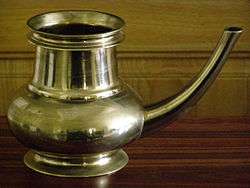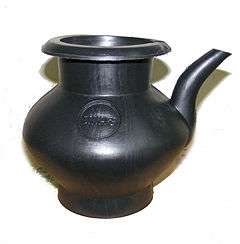Lota (vessel)
A lota (Hindi: लोटा, Odia: ଲୋଟା/ନୋଟା, Urdu: لوٹا), a type of spouted vessel made of brass, copper or plastic used in Indian subcontinent,[1] specially in the Indian-origin religions (Hinduism, Buddhism, Jainism and Sikhism),[2] since at least 2nd millennium BC.[3] In the Indian-origin religions, the copper lota has sacred usage, such as in yagna ritual during puja prayers, weddings and other sacred ceremonies.[2] According to the ancient Indian/Hindu-origin traditional medicine system of ayurveda, drinking water stored in the copper lota has health and nutritional benefits.[4]


Its regional variations include bodna (Bengali: বদনা) in Bengali language and kindi in Kerala state.
Archaeology
Early examples of lota and kindi first appear in Chalcolithic period cultures of South Asia, notably in Savalda Culture and two well-preserved examples from Jorwe culture pottery dating back to 2nd millennium BC.[3][5]
Design
Review and reactions
American designers Charles and Ray Eames in their The India Report expressed a great admiration for the lota, saying about its design, "Of all the objects we have seen and admired during our visit to India, the Lota, that simple vessel of everyday use, stands out as perhaps the greatest, the most beautiful."[6][7][8]
Regional names and other variations
In West Bengal and parts of Bangladesh, the term bôdnā (Bengali: বদনা) describes spouted (teapot-like) vessels, and the vessels used for puja are called ghôt or ghôti, while lotā is used for bath mugs, .[9] In Odisha, vessels without the spout is also known as lota.[2]
Usage
Idioms and literature
In some parts of Pakistan and India, the use of the phrase "bependi ka lota" (a "lota without a base") is colloquially used to refer to a person who may switch their loyalties. This comes from the observation that a spherical lota without a base tends to roll over in unpredictable directions when kept on uneven ground. The neologism "lotacracy" was coined in Pakistan to describe politicians who would switch parties.[10]
Health
According to the ancient Indian/Hindu-origin traditional medicine system of ayurveda, drinking water stored in the copper lota has health and nutritional benefits.[4]
Holy rituals
In the Indian-origin religions, the lota is a multipurpose utensil. It is also used in the sacred rituals,[2] such as yagna, puja, wedding and other sacred ceremonies.
Ritual cleansing
In the Indian subcontinent, the lota is employed to cleanse oneself.[11]
In Bengali, the term lotā is used for bath mugs. People of the desi diaspora may use watering cans, empty bottles or cups for cleansing purpose. Muslims use lota for the istinja cleansing rituals, such as wudu, bath and anal cleansing.[9]
Citations
- "Definition of Lota". Merriam-Webster's Online Dictionary. Retrieved 22 March 2007.
- Daniel Miller, 1985, Artefacts as Categories: A Study of Ceramic Variability in Central India, pages 126–130.
- Singh, Upinder (2008). A History of Ancient and Early Medieval India: From the Stone Age to the 12th Century. Delhi: Pearson Education. pp. 229–233. ISBN 978-81-317-1120-0.
- 11 Amazing Healing Benefits of Drinking Water in a Copper Vessel, NDTV, 06 July 2018.
- "Excavations - Important - Maharashtra". Archaeological Survey of India. Archived from the original on 11 October 2011. Retrieved 1 September 2010.
- Demetrios, Eames (9 February 2002). "An Eames Primer". Universe Publishing. Retrieved 22 March 2007.
- "Eames' India Report". National Institute of Design, Ahmedabad, India. Archived from the original on 9 March 2007. Retrieved 22 March 2007.
- "Charles & Ray Eames India Report, April 1958", Design Observer
- Akbar, Javaria (11 December 2014). "A Muslim's Guide to Anal Hygiene". Vice. Retrieved 9 September 2019.
- Gauhar, Humayun (24 January 2011). "Blasphemy…or a convenience?". Saudi Gazette. Okaz Organization for Press and Publication. Archived from the original on 30 March 2012. Retrieved 24 January 2011.
- Donald Albrecht (2009). The Work of Charles and Ray Eames: a Legacy of Invention. Harry N. Abrams. Retrieved 5 September 2011.
India and Pakistan have a water culture, so that it is preferable to use a lota to cleanse with after using the washroom.
External links
| Wikimedia Commons has media related to Lota (vessel). |
- Bodna Nai—Music video depicting the extinction of the bodna from urban Bangladesh
- The Lota Blog—A comedic blog about the use and application of the lota in modern times
- Nuevos Habitos—An artist dedicated to lota and other stuff